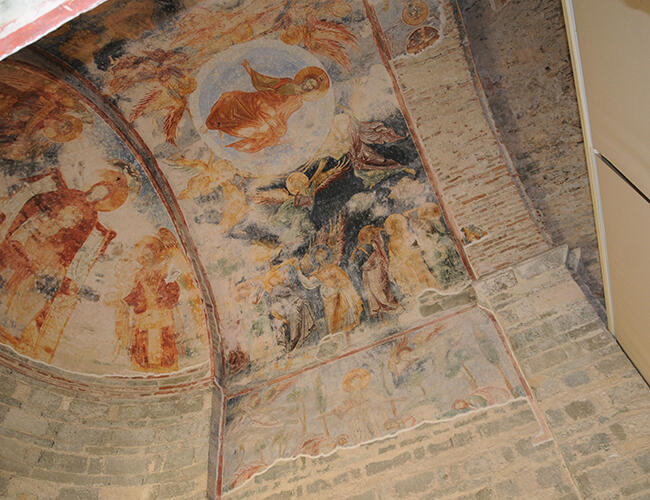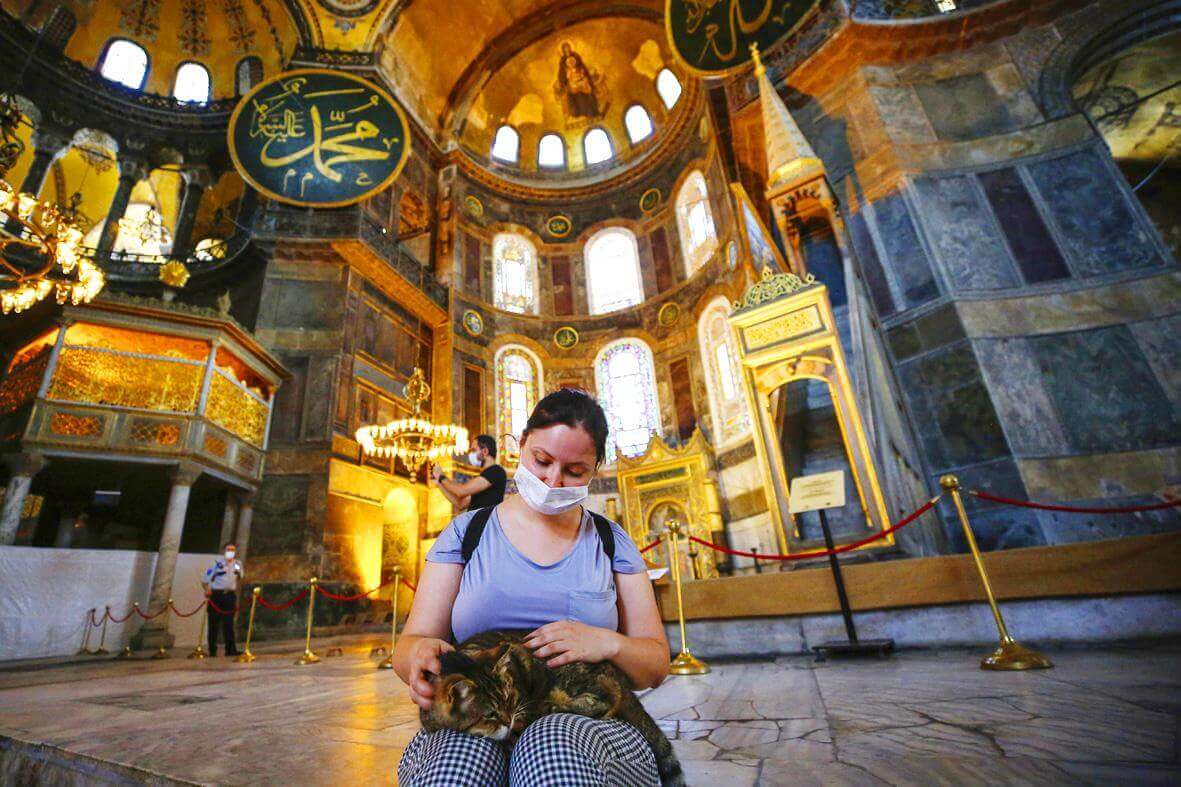On 2 July, Turkey’s administrative court held a special 17-minute long hearing to decide on whether it can allow the current administration to convert the iconic museum and tourist destination, the Hagia Sophia, into a mosque. Representatives from the Turkish group, Permanent Foundations and Service to Historical Artefacts and the Environment, had petitioned against the conversion of the mosque into a museum, which was carried out via a cabinet decision by the country's founding statesman in 1935.
On Friday, President Recep Tayyip Erdoğan declared that the Istanbul museum would officially be known as a mosque after the top court overturned the ancient monument's status by deeming the 1935 museum conversion as “illegal”. Brushing aside all the international criticism that has come his way, Erdoğan also announced that the Hagia Sophia would be hosting its first official Friday prayers on 24 July.
The Hagia Sophia, known locally as Ayasofya, is a 1,500+ year old UNESCO World Heritage Site located in the heart of Istanbul. Known for its beautiful architecture, “giant buttresses and soaring minarets”, the structure has, for centuries, juxtaposed the odd marriage of two starkly different cultures. Built in the Byzantine seat of Constantinople in around 535 AD, the Hagia Sophia—“Holy Wisdom”—was, at the time, the world’s largest cathedral. In 1453, when Constantinople was conquered by Sultan Mehmet II and the Ottoman forces, the monument served as the empire’s Imperial Mosque, which is when its iconic frescoes and mosaics were painted over and minarets built, turning the structure into a symbol of dissonance and hate between Orthodox Christians and Muslims for over 500 years. 
However, when the Empire was abolished in 1934 to make way for the Republic under the leadership of Mustafa Kemal Pasha, known more commonly as Ataturk, Ottoman Islam was replaced with secular ideals. In 1935, Ataturk officially turned the Hagia Sophia into a museum, uncovering the desecrated parts of the structure, to allow for peace among religions and to encourage Christians from across the world to relive their cultural heritage. Ataturk had also introduced more rigid anti-religious reforms at the time, including a ban on wearing religious symbols like the hijab in state institutions. Many of these rules were understandably repealed over time to make way for religious freedoms while still maintaining a secular ethos around the country.
Yet, calls to restore the structure to its “original” status as a place of worship have been rampant in Istanbul over the past few years. This has been especially exacerbated since Erdoğan began easing restrictions for Islamic activity in the museum premises and began to openly advocate the resumption of the structure’s status to that of a mosque since around 2016.
It is more than apparent that Erdoğan, whose neo-Ottoman nationalist rhetoric has determined the country’s political discourse for more than a decade, has backed this idea in an attempt to satiate his conservative Muslim voter base who have historically viewed Ataturk’s reformations as “catastrophic”. The Turkish President has been trying to subtly push Islam back into the secular Turkish public imagination ever since his emergence as a prominent politician as the founder of the Justice and Development Party (AKP) over 17 years ago.
Since 2016, the Erdoğan administration assigned a full-time imam to the Hagia Sophia, who sounds the call to prayer from the minarets. A Qur’an reading and public prayer was also conducted in the premises during the holy night of Laylat al-Qadr in 2017. Most recently, on 29 May, a live video of a cleric sitting in the museum reciting Qur’anic verses was broadcast as a part of the city’s celebration of the 567th anniversary of the conquest of Constantinople. A large screen with a live feed of Erdoğan was also beaming next to the cleric. It is worth noting, however, that even though the Turkish government had outlawed the use of the Hagia Sophia for any religious purposes since the establishment of the modern state, staff of both faiths have been permitted to pray in designated prayer rooms in the museum complex.
But moves towards the Islamic use of the museum created a stir among Orthodox Christian churches in Turkey and around the world. Istanbul-based Ecumenical Patriarch Bartholomew, who serves as a spiritual head for around 300 million Orthodox Christians from across the globe, stated that converting the heritage site to a mosque could potentially “fracture” relations between the East and the West. The UNESCO has also warned Ankara of the threat this may pose to the structure’s heritage site status, stating that current agreements require local governments to seek approval before altering the status of any site recognized by the World Heritage Committee. As a World Heritage Site, the Hagia Sophia attracts millions in tourism revenue and ensures timely and sustainable repairs and restoration of the monument under UN auspices. But this does not seem to matter to Erdoğan.
Unfortunately, UNESCO’s World Heritage Centre has also hardly been effective in its ability to mediate such issues. In a border dispute between Thailand and Cambodia which was later resolved by the International Court of Justice in 2013, representatives from the UNESCO sent to explore the disputed Preah Vihear Temple in Khmer entered the territory without any prior notice to Thai authorities. This exploration was perceived as a diplomatic affront to Thailand, who questioned the assertion of jurisdiction by the international body. Further, in the Middle East, the UNESCO has also alienated the United States and Israel, with both countries opting to leave the body after it gave full state recognition to Palestine in 2017. Since then, the global credibility of the body, as well as the funding it receives have both been in jeopardy.
With this glaring vacuum in international law, Erdoğan and his government have rejected criticisms of their moves to turn the Hagia Sophia back into a mosque. Foreign Minister Mevlut Cavusoglu also emphasized that any criticism of the Turkish state’s decision on the monument would be considered a violation of its national sovereignty. And given the lack of powers by the UNESCO or any other international body to intervene, not much has stopped the Turkish administration or its judiciary from overturning an 85-year-old law.
At the same time, it is worth considering the diplomatic losses that Ankara stands to suffer due to this decision. One of the starkest oppositions to the idea of mosque revival at the Hagia Sophia came from a senior official at the Russian Orthodox Church, who deemed the move as “unacceptable”. And while Kremlin spokesperson Dmitry Peskov maintained diplomatic distance by acknowledging the matter as Turkey’s internal affair, he stressed that Russians see the monument not just for its tourist value, but its “sacred spiritual value”, that must be saved.
A few weeks ago, these statements from Moscow may not have held much value—in all practicality, they have not altered Ankara’s decision on the monument. However, with the recent adoption of sweeping constitutional amendments that include the official recognition and importance of God, it seems as though Vladimir Putin and his administration will also continue to pander to the country’s Orthodox Christians and other religious conservatives by upholding traditional values. It is not long before this seeps its way into Russian foreign policy as well. One hopes that this does not hamper ongoing talks towards a peaceful ceasefire in the proxy war between the two countries in Libya and Syria, or worse, add fuel to the already burning fire in the two countries’ warring involvement in the Middle East conflicts.
The Orthodox Church has already warned Ankara of retaliatory action, stating that “a threat to Hagia Sophia is a threat to the whole of Christian civilization.” Turkey must, therefore, seriously consider retracting its decision lest this issue turn into a Huntington-esque clash of civilizations.
Further, US Secretary of State Mike Pompeo “urged” Erdoğan to rethink the restoration. The reinforcement of Islamic ideals may further ire the Western power, whose proposed military training partnership in Greek Cyprus has already been lambasted by the Turkish foreign ministry. The US and Turkey anyway do not share very cordial relations, but their mutual distrust for Russia and shared interests in Libya have remote possibilities of blossoming into a strategic or a military partnership to broker peace in the region. However, the Trump administration is staunchly supported by Conservative Christians and Jews who would definitely take offence if the museum is converted to a mosque. In the worst case, this move may prompt the US Senate to—as has been its strategy lately—reimpose crippling economic sanctions against Erdoğan’s government.
Of course, religious and political authorities from Greece have also condemned the Turkish decision on the Hagia Sophia. The Greek Foreign Ministry heavily criticized the May reading of Qur’anic passages in the museum. After the verdict was announced, the country's Culture Minister went on to call the conversion “a provocation”. Manfred Weber, a member of the European Parliament, also pointed out that while Turkey was a crucial partner for Europe, its “gunboat diplomacy” of illegal drilling in Greek Cyprus’ exclusive economic zone, as well as attacks on the Greek border by violating the country’s airspace has been far from acceptable. He further stressed that the European Union and the EUP should take precautions to protect themselves from Turkish aggression on the region’s southern borders. Therefore, in addition to all of these offences, the added threat of erasure of European history from Istanbul may sour Turkish-European relations.
Hence, while the actual change of the museum to a mosque may not pose any immediately tangible threats to Ankara—except a loss in tourism revenue—it does stand to add to a long list of human rights and international law violations by Turkish forces in the region that are irking Western powers and Russian forces. Locals—especially young voters—do not even consider the Hagia Sophia to be much of an issue as they are more concerned with issues of the economy and governance. But the reversal of years of secularism in Istanbul and its replacement with conservative Islamic interests may end up hurting Erdoğan in his several foreign interventions and rather expansionist regional policies.
A spokesperson for the President has tried to placate the opposition by saying that the mosque will retain its structural integrity and continue to allow visitors, as do several other mosques in Istanbul and across the country. However, the symbolic gesture of turning a secular, unifying historical space into one that, at least at face value, recognizes only one religion and its side of history as legitimate, has strengthened Erdoğan’s perception as an anti-secular Islamic leader which is bound to irk Russia or the West enough to take action quite soon. Whether the leader really cares about these repercussions, though, is a topic worth analyzing further.
Image Source: Taipei Times

